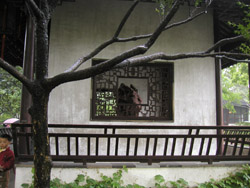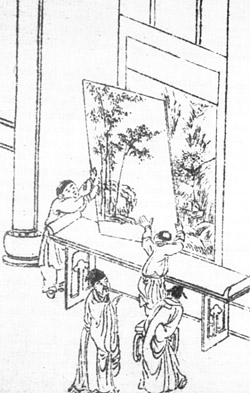| Connecting otherwise unlinked spaces along axes of sensation is an old and rich game. It constitutes one of the more interesting tactics used in gardens to create experiential complexity. Several instances: Borrowed scenes work on the mutual conceit of the window as an image and an image as a window. In a garden a shallow space behind an opening may be composed with plants and stones in imitation of a painted composition. LI Yu 李漁 (1610—1680), a late Ming/ early Qing writer (and conceptual artist had the term been known) took the game further, framing his borrowed scene with paper as if it were a painting. And then he had a painting made to hang in the window, substituting the scene - and so taking matters to their ultimate conclusion. Sound can also be 'borrowed', and may relate to inscriptions in nearby spaces. A text referring to wind through pines or the trickling of water may be strategically separated from the a nearby source of these sounds. On reading, the relation is made, the game sprung. Similarly, borrowed smells may be a seasonal matter, with fragrant plantings hidden under or beside a window or passage, and also suggested to the passerby through an inscription. | | 

Suzhou
2004
| 

Illustration to LI Yu's writings
Qing period (1644-1911)
Woodblock print |